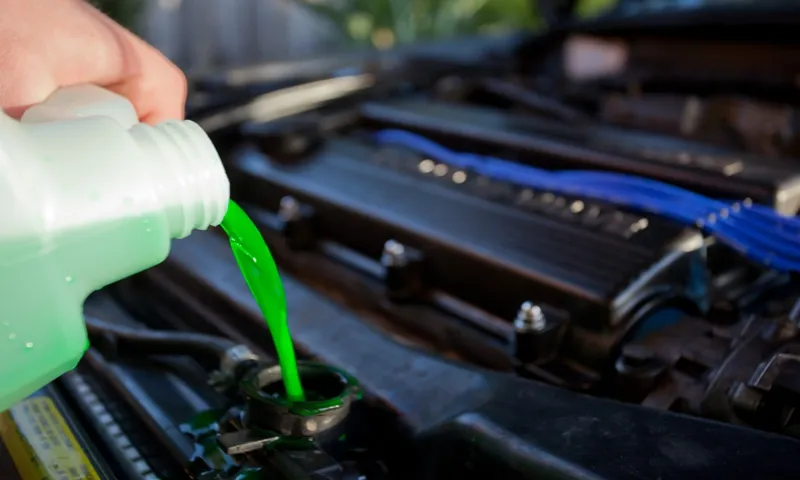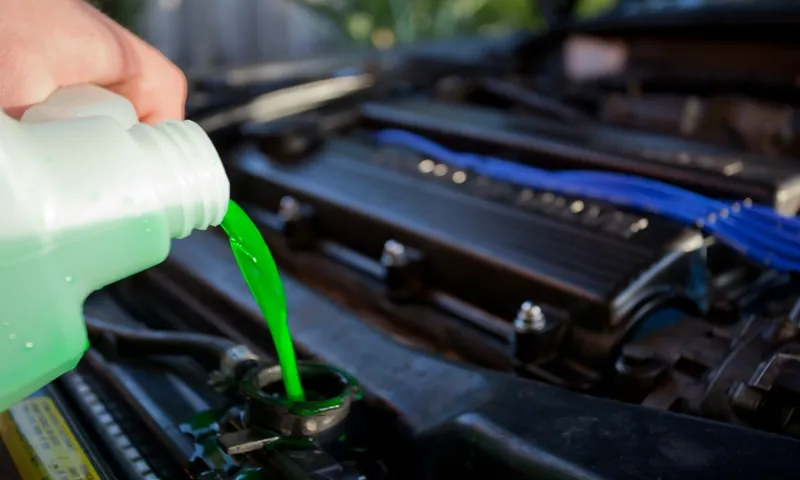Engine coolant is a vital component in keeping your vehicle’s engine running smoothly and efficiently. But have you ever wondered what exactly it is and why it’s so important? Well, wonder no more! In this blog post, we’ll dive deep into the world of engine coolant and explore its role in maintaining your car’s optimal temperature. Think of engine coolant as the lifeblood of your vehicle’s engine.
Just like our bodies need water to function properly, an engine needs coolant to prevent it from overheating. In simple terms, engine coolant, also known as antifreeze, is a specially formulated liquid that circulates through your car’s engine, absorbing and dissipating heat. But why is heat such a big deal for engines? Well, think about how much heat is generated when your car is in motion.
The engine works hard to convert fuel into power, and this process generates a tremendous amount of heat. Without proper cooling, the engine can overheat, leading to costly repairs and potentially catastrophic damage. Engine coolant acts as a coolant by absorbing the heat generated by the engine.
It then carries this heat away from the engine and radiates it into the surrounding air through the radiator. This continuous cycle of absorbing heat and dissipating it keeps the engine running at its optimal operating temperature. Not all engine coolants are created equal.
There are different types of coolants, including ethylene glycol-based and propylene glycol-based coolants. Each type has its own unique properties and advantages, so it’s crucial to choose the right coolant for your vehicle. Additionally, coolant manufacturers often add supplemental additives to enhance the coolant’s performance, such as corrosion inhibitors and lubricants.
In addition to its cooling properties, engine coolant also provides protection against freezing in cold weather. By lowering the freezing point of the coolant, it prevents the coolant from solidifying and damaging the engine during winter months. In essence, engine coolant is like a supernatural mix of cooling superhero and winter warrior, keeping your engine safe and sound in any weather condition.
Table of Contents
Definition of Engine Coolant
Engine coolant, also known as antifreeze, is a liquid that is used to regulate the temperature of the engine in a vehicle. It is typically made up of a mixture of water and ethylene glycol or propylene glycol. Engine coolant is important because it helps to prevent the engine from overheating or freezing.
It circulates through the engine and absorbs heat, which allows the engine to operate at its optimal temperature. This not only helps to prevent damage to the engine, but it also plays a crucial role in maintaining fuel efficiency. Engine coolant is usually bright green, but it can also be orange, yellow, or pink, depending on the type of coolant used.
It is important to regularly check and replace the coolant in your vehicle to ensure that your engine is properly protected and running smoothly.
The Role of Engine Coolant
engine coolant, coolant, vehicle maintenance, overheating, radiator, cooling system, temperature regulation, antifreeze, corrosion protection

Different Types of Engine Coolant
engine coolant
Why is Engine Coolant Important?
Engine coolant, also known as antifreeze, is a crucial component of a vehicle’s cooling system. It is a liquid substance that helps regulate and maintain the optimal temperature of the engine. But what exactly is engine coolant and why is it important? Engine coolant is a specially formulated mixture of water and chemicals, typically ethylene glycol or propylene glycol.
It serves several important functions in the engine. Firstly, it helps prevent the engine from overheating by absorbing and dissipating heat from the engine block and other hot components. This prevents the engine from reaching dangerously high temperatures that can cause damage or even complete engine failure.
Furthermore, engine coolant also helps protect the engine from freezing in cold weather conditions. It lowers the freezing point of water, preventing the coolant from solidifying and causing damage to the engine. This is especially important in regions with colder climates where freezing temperatures are common.
Engine coolant also plays a role in preventing corrosion and rusting within the engine. It contains additives that help lubricate the various components of the cooling system, preventing wear and tear. Additionally, it contains inhibitors that prevent the formation of rust and scale, prolonging the lifespan of the cooling system.
Regular maintenance of the engine coolant is essential to ensure its effectiveness. Over time, the coolant may become contaminated or lose its protective properties, leading to a decrease in its ability to regulate temperature and protect the engine. It is recommended to have the coolant flushed and replaced according to the manufacturer’s guidelines, typically every two to five years.
In conclusion, engine coolant is a vital component of a vehicle’s cooling system. It helps regulate the temperature of the engine, protect it from freezing and corrosion, and prolong its lifespan. Regular maintenance and replacement of coolant are necessary to ensure its effectiveness and to keep the engine running smoothly.
Preventing Overheating
“You’re driving along, enjoying the open road, when suddenly your engine starts to overheat. It’s a situation that no one wants to experience, and it can lead to serious damage to your vehicle if not addressed quickly. That’s where engine coolant comes in.
Engine coolant, also known as antifreeze, is a vital component in preventing overheating. It circulates through the engine, absorbing heat and transferring it to the radiator where it can be dissipated. Without coolant, the engine would quickly reach temperatures that could cause permanent damage.
It’s like your car’s own personal cooling system, keeping everything running smoothly and preventing any meltdowns. So next time you’re tempted to skip checking your coolant levels, remember just how important it is in keeping your engine cool and preventing any costly repairs.”
Protecting Against Freezing
engine coolant Engine coolant is an essential component of a vehicle’s cooling system that plays a crucial role in preventing the engine from freezing in cold weather. In extremely low temperatures, the water in the engine can freeze, causing severe damage to the engine and other components. This is where engine coolant, also known as antifreeze, comes in.
Engine coolant is a mixture of water and ethylene glycol or propylene glycol, along with additives that enhance its performance. Its primary function is to lower the freezing point of the water inside the engine, allowing it to remain in a liquid state even in sub-zero temperatures. But why is this important? Well, when water freezes, it expands and can create pressure inside the engine, leading to cracked or burst pipes, hoses, and even engine blocks.
This can result in costly repairs and leave you stranded on the side of the road. Engine coolant also serves another important purpose – it helps to regulate the temperature of the engine. In addition to preventing freezing, the coolant also prevents the engine from overheating.
It absorbs the excess heat generated by the engine and transfers it to the radiator, where it is dissipated into the surrounding air. In summary, engine coolant is crucial for protecting your engine from freezing in cold weather and preventing overheating in hot weather. By using a proper mix of coolant and water, you can ensure that your engine stays in optimal condition and avoid costly repairs.
So, next time you fill up your coolant reservoir, remember the importance of this simple yet vital liquid in keeping your engine running smoothly.
Preventing Corrosion
Engine coolant is an essential component of a vehicle’s cooling system, and its importance cannot be overstated when it comes to preventing corrosion. Corrosion occurs when metals in the engine come into contact with water, oxygen, and other contaminants, leading to the breakdown of materials and damage to vital engine components. Engine coolant, also known as antifreeze, plays a crucial role in preventing this corrosion by creating a protective barrier over the metal surfaces, preventing water and other corrosive elements from coming into direct contact with them.
Additionally, engine coolant helps to regulate the temperature of the engine by absorbing heat and transferring it to the radiator, where it can be dissipated. This not only prevents the engine from overheating but also helps to extend its lifespan. So, next time you check your vehicle’s coolant level, remember that you’re not just topping it up – you’re protecting your engine from the harmful effects of corrosion.
How Does Engine Coolant Work?
Engine coolant, also known as antifreeze, is a liquid that plays a critical role in maintaining the temperature of an engine. It circulates through the engine and absorbs heat generated by the combustion process. But what exactly is engine coolant made of? Well, it’s a mixture of water and a special chemical called ethylene glycol.
This combination has a higher boiling point and lower freezing point than plain water, making it ideal for withstanding the extreme temperatures that your engine can reach. So, how does engine coolant work? When the engine is running, coolant is pumped through the engine block and cylinder heads, where it absorbs heat from the hottest parts of the engine. It then flows back to the radiator, which is located at the front of the vehicle.
Here, the coolant passes through thin metal tubes surrounded by fins. As air passes through these fins, it cools the coolant down and dissipates the heat into the surrounding atmosphere. The cooled coolant then makes its way back into the engine to repeat the process.
This continuous cycle of absorbing heat and dissipating it helps to regulate the temperature of the engine, preventing it from overheating or freezing. It also protects the engine from corrosion, as it contains additives that inhibit the formation of rust and scale within the cooling system. Additionally, the ethylene glycol in the coolant helps to prevent the water from freezing in cold temperatures, ensuring that the engine remains operational even in extremely cold conditions.
In summary, engine coolant is a crucial component in ensuring the smooth operation of your vehicle. It helps to regulate the temperature of the engine, protect it from corrosion, and prevent freezing. So, the next time you see that bright-colored liquid under the hood of your car, remember that it’s not just there for show – it’s an essential part of keeping your engine running smoothly.
Coolant Flow in a Car Engine
engine coolant, coolant flow, car engine, How Does Engine Coolant Work
Heat Transfer Process
engine coolant, heat transfer process, radiator, engine temperature, cooling system. One of the key components in a car’s cooling system is the engine coolant. Have you ever wondered how it works to keep your engine at the right temperature? Well, let’s dive into the fascinating heat transfer process that goes on under the hood.
When your car’s engine runs, it generates a lot of heat. This heat needs to be dissipated to prevent the engine from overheating. That’s where the engine coolant comes in.
The coolant is a mixture of water and antifreeze that is circulated through the engine and radiator. As the hot coolant flows through the engine, it absorbs the heat produced by the combustion process. The coolant then carries this heat to the radiator, where it is dispersed into the surrounding air.
This transfer of heat helps to regulate the engine temperature and prevent overheating. But how does the engine coolant actually transfer the heat? It works through a combination of conduction, convection, and radiation. Conduction is the process by which heat is transferred from the engine to the coolant through direct contact.
Convection is the movement of the hot coolant through the engine and radiator, allowing the heat to be carried away. And radiation is the emission of heat energy from the hot coolant into the surrounding air. The radiator plays a crucial role in this heat transfer process.
It is designed with a series of tubes and fins that increase the surface area for heat exchange. As the coolant flows through the tubes, the fins help to dissipate the heat into the air passing over them. This process cools down the coolant, preparing it to be recirculated back into the engine to absorb more heat.
How to Check and Maintain Engine Coolant
Engine coolant, also known as antifreeze, is an important part of your vehicle’s cooling system. Its primary function is to regulate the temperature of the engine and prevent it from overheating. But what exactly is engine coolant made of? Engine coolant is typically a mixture of water and ethylene or propylene glycol, along with additives to enhance its performance.
The glycol acts as the main cooling agent, while the additives help to prevent corrosion, lubricate the water pump, and maintain the pH level of the coolant. Without engine coolant, your vehicle’s engine would quickly overheat, leading to potentially costly and damaging consequences. So, it’s essential to regularly check and maintain the coolant level to ensure your engine stays cool and runs smoothly.
Checking Coolant Level
engine coolant, coolant level, check coolant level
Toppping Up Coolant
topping up coolant, check engine coolant, engine coolant maintenance Engine coolant plays a vital role in the overall performance and longevity of your vehicle’s engine. It helps to regulate the temperature by absorbing the heat generated from the engine and transferring it to the radiator where it can be cooled down. Without proper levels of coolant, your engine could overheat and potentially cause severe damage.
That’s why it’s essential to regularly check and maintain your engine coolant. To check your engine coolant, start by locating the coolant reservoir under the hood. It’s typically a translucent plastic container with minimum and maximum level marks on the side.
Ensure that the engine is completely cool before removing the cap to avoid any injuries from hot coolant. Once the cap is off, you can visually inspect the coolant level. If it’s below the minimum mark, you will need to top it up.
To top up the coolant, you’ll need to prepare a mixture of coolant and water according to the manufacturer’s recommendations. It’s important to use the correct coolant type specified for your vehicle, as using the wrong type can lead to engine damage. Carefully pour the mixture into the coolant reservoir, making sure not to exceed the maximum level mark.
Once you’ve added the coolant, replace the cap securely. In addition to checking the coolant level, it’s also important to inspect the condition of the coolant. Over time, coolant can become contaminated with debris, rust, or other contaminants, which can affect its performance.
If the coolant appears dirty or discolored, it may be time to flush and replace it. This is typically recommended every couple of years or as specified by the manufacturer. Regularly maintaining your engine coolant is crucial for the health of your engine.
Flushing and Replacing Coolant
engine coolant, check coolant level, maintaining engine coolant, replace engine coolant
Conclusion: Importance of Engine Coolant
In conclusion, engine coolant is like the superhero of your car’s engine, tirelessly working to keep it cool and prevent potential meltdown. It’s a liquid concoction of chemicals designed to remove excess heat from the engine and ensure it’s operating at optimal temperature. But engine coolant doesn’t stop at just cooling things down; it also acts as a bodyguard, defending against pesky rust, corrosion, and other evil villains that threaten to damage your engine.
It’s like a force field, creating a protective barrier between metallic components and the harsh realities of the outside world. And just like any good superhero, engine coolant knows how to multitask. It’s an undercover agent, secretly aiding in the transfer of heat from the engine to the radiator, where it can be dispersed into the air and send those temperature levels plummeting.
But engine coolant isn’t just here to save the day – it’s also a smooth operator. With its ability to reduce friction and improve the lubrication of moving parts, engine coolant ensures that everything in your engine runs like a well-oiled machine (pun intended). So next time you pop open that hood and catch a glimpse of that vibrant liquid flowing through your car’s veins, remember that engine coolant is the unsung hero, silently working behind the scenes to keep your engine cool, protected, and running smoothly.
FAQs
What is engine coolant?
Engine coolant, also known as antifreeze, is a liquid substance that is used to regulate the temperature of the engine in a vehicle. It is typically made up of a mixture of water and ethylene or propylene glycol, along with other additives to prevent corrosion and maintain the cooling system’s efficiency.
How does engine coolant work?
Engine coolant works by circulating through the engine and absorbing the heat generated by the combustion process. It then carries the heat away from the engine and releases it through the radiator, which cools the coolant down before it goes back into the engine to absorb more heat.
Why is engine coolant important?
Engine coolant is important because it helps prevent the engine from overheating. It also helps protect the engine and other components of the cooling system from corrosion and freezing in cold temperatures. Additionally, engine coolant helps maintain the engine’s efficiency and prolong its lifespan.
How often should engine coolant be replaced?
The frequency of coolant replacement depends on the type of coolant used and the manufacturer’s recommendations. In general, it is recommended to replace engine coolant every 2 to 5 years or every 30,000 to 50,000 miles. However, it is best to refer to your vehicle’s owner’s manual for specific guidelines.
Can I mix different types of engine coolant?
It is generally not recommended to mix different types of engine coolant unless they are specifically designed to be compatible. Mixing incompatible coolants can cause chemical reactions and lead to cooling system damage or clogging. It is best to consult your vehicle’s manufacturer or a professional mechanic for advice on coolant mixing.
What happens if engine coolant is not topped up?
If the engine coolant is not topped up to the proper level, the engine can overheat, which can result in serious damage to the engine components. It is important to regularly check the coolant level and top it up as needed to ensure the engine stays within the optimal temperature range.
How can I check the coolant level in my vehicle?
To check the coolant level in your vehicle, refer to the owner’s manual for the specific location of the coolant reservoir. Once you locate it, ensure the engine is cool before removing the cap or dipstick. The coolant level should be between the minimum and maximum markings on the reservoir. If it is below the minimum level, top it up with the appropriate coolant mixture.



